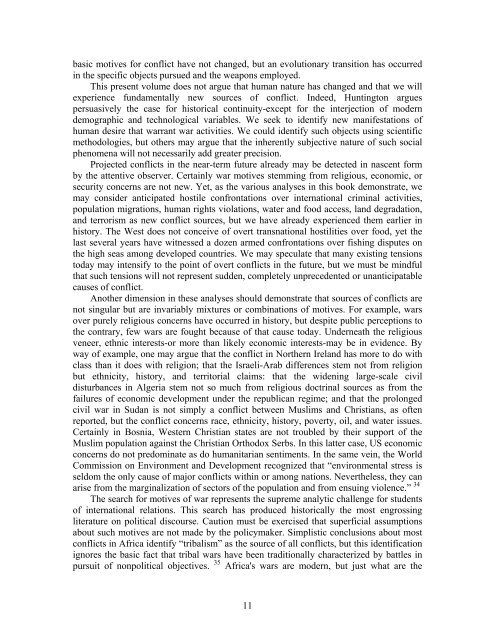Global Security Concerns - Project Gutenberg Consortia Center
Global Security Concerns - Project Gutenberg Consortia Center
Global Security Concerns - Project Gutenberg Consortia Center
You also want an ePaper? Increase the reach of your titles
YUMPU automatically turns print PDFs into web optimized ePapers that Google loves.
asic motives for conflict have not changed, but an evolutionary transition has occurred<br />
in the specific objects pursued and the weapons employed.<br />
This present volume does not argue that human nature has changed and that we will<br />
experience fundamentally new sources of conflict. Indeed, Huntington argues<br />
persuasively the case for historical continuity-except for the interjection of modern<br />
demographic and technological variables. We seek to identify new manifestations of<br />
human desire that warrant war activities. We could identify such objects using scientific<br />
methodologies, but others may argue that the inherently subjective nature of such social<br />
phenomena will not necessarily add greater precision.<br />
<strong>Project</strong>ed conflicts in the near-term future already may be detected in nascent form<br />
by the attentive observer. Certainly war motives stemming from religious, economic, or<br />
security concerns are not new. Yet, as the various analyses in this book demonstrate, we<br />
may consider anticipated hostile confrontations over international criminal activities,<br />
population migrations, human rights violations, water and food access, land degradation,<br />
and terrorism as new conflict sources, but we have already experienced them earlier in<br />
history. The West does not conceive of overt transnational hostilities over food, yet the<br />
last several years have witnessed a dozen armed confrontations over fishing disputes on<br />
the high seas among developed countries. We may speculate that many existing tensions<br />
today may intensify to the point of overt conflicts in the future, but we must be mindful<br />
that such tensions will not represent sudden, completely unprecedented or unanticipatable<br />
causes of conflict.<br />
Another dimension in these analyses should demonstrate that sources of conflicts are<br />
not singular but are invariably mixtures or combinations of motives. For example, wars<br />
over purely religious concerns have occurred in history, but despite public perceptions to<br />
the contrary, few wars are fought because of that cause today. Underneath the religious<br />
veneer, ethnic interests-or more than likely economic interests-may be in evidence. By<br />
way of example, one may argue that the conflict in Northern Ireland has more to do with<br />
class than it does with religion; that the Israeli-Arab differences stem not from religion<br />
but ethnicity, history, and territorial claims: that the widening large-scale civil<br />
disturbances in Algeria stem not so much from religious doctrinal sources as from the<br />
failures of economic development under the republican regime; and that the prolonged<br />
civil war in Sudan is not simply a conflict between Muslims and Christians, as often<br />
reported, but the conflict concerns race, ethnicity, history, poverty, oil, and water issues.<br />
Certainly in Bosnia, Western Christian states are not troubled by their support of the<br />
Muslim population against the Christian Orthodox Serbs. In this latter case, US economic<br />
concerns do not predominate as do humanitarian sentiments. In the same vein, the World<br />
Commission on Environment and Development recognized that “environmental stress is<br />
seldom the only cause of major conflicts within or among nations. Nevertheless, they can<br />
arise from the marginalization of sectors of the population and from ensuing violence.” 34<br />
The search for motives of war represents the supreme analytic challenge for students<br />
of international relations. This search has produced historically the most engrossing<br />
literature on political discourse. Caution must be exercised that superficial assumptions<br />
about such motives are not made by the policymaker. Simplistic conclusions about most<br />
conflicts in Africa identify “tribalism” as the source of all conflicts, but this identification<br />
ignores the basic fact that tribal wars have been traditionally characterized by battles in<br />
pursuit of nonpolitical objectives. 35 Africa's wars are modern, but just what are the<br />
11






